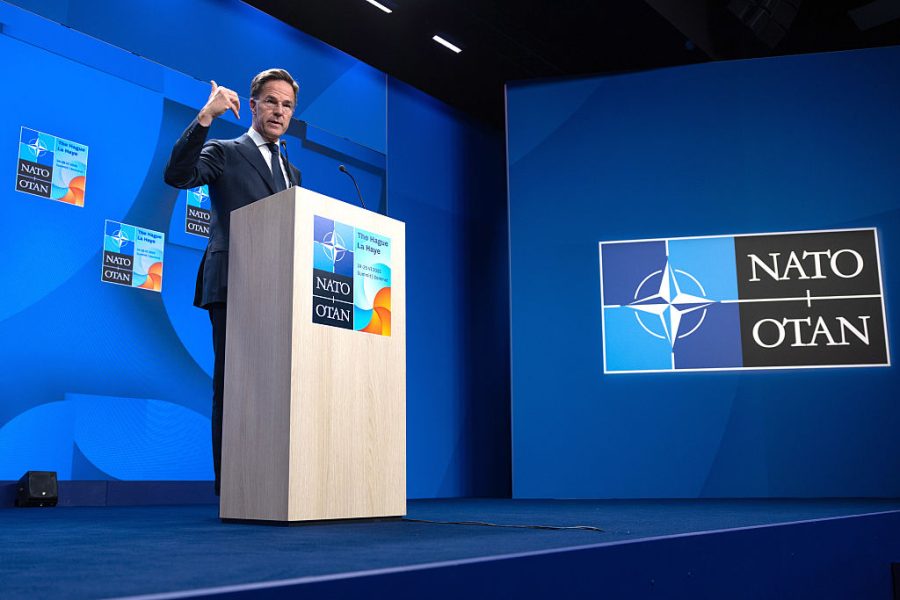Today is the first day of Nato’s annual summit. Some have billed it as potentially the most important meeting in the alliance’s recent history, while others have played down any expectations of major announcements.
One issue which will undoubtedly concern the 32 Nato heads of state and government is the level of defence spending. Nineteen years after it was first agreed by defence ministers and 11 years after it was reaffirmed in the Wales Summit Declaration, the target of spending 2 per cent of GDP on defence is expected to be met by all member states in 2025.
It is clear, however, that 2 per cent is woefully inadequate. Rutte said in a recent speech that this summit would agree a new target of 5 per cent – 3.5 per cent on core military requirements and the remaining 1.5 per cent on ‘defence and security-related investments, including infrastructure and building industrial capacity’.
No country’s membership, not even America’s, is priceless
Yesterday, former defence secretary Sir Ben Wallace took to the pages of the Times to frame the need for more spending bluntly. President Trump, he argued, should ‘declare this week that Nato will become an organisation whose membership is based on a subscription’, and that any members who fail to reach that level of 3.5 per cent of GDP by 2030 should enjoy ‘no protection from Uncle Sam’.
Wallace is not plucking this argument out of the air. He was the UK’s defence secretary from 2019 to 2023 (the third longest tenure ever), and was touted by many as a potential candidate for secretary general of Nato. He knows the alliance and he knows its defence ministers, either personally or by archetype. The new spending target is not a done deal: the Spanish prime minister, Pedro Sánchez, believes he has achieved an opt-out, and this will make it hard to persuade low-spending nations like Belgium (1.3 per cent) or Italy (1.49 per cent) commit to 5 per cent.
It is often said by his defenders that President Trump has made Nato face the fact that many member states had underspent on their own defence capabilities for decades; they had relied on the knowledge that, in extremis, the alliance’s collective security delivered by US military power would protect them. Amid Trump’s catastrophically wayward attitude to governance, fantasy-based economic policy and systematic undermining of the US constitution, this is, to a large degree, true: even a stopped clock is right twice a day (though Trump does not manage that kind of regularity).
In 2014, three Nato members – the United States, the United Kingdom and Greece – were meeting the 2 per cent target. This year, all members are expected to. That owes a great deal to Trump’s threats and bullying: the fear, which may still be realised, that he will effectively abandon the alliance. (Section 1250A of the National Defense Authorization Act for Fiscal Year 2024 prohibits formal withdrawal without a two-thirds majority in the Senate or an act of Congress.)
Spain’s attitude is outrageous and unacceptable. Sánchez’s statement that by spending only 2.1 per cent his country can ‘acquire and maintain all the personnel, equipment, and infrastructures requested by the alliance to confront these threats with our capabilities’ is a grotesque abnegation of responsibilities and flies in the face of the fundamental spirit of collective security. Writing to the secretary general last week, Sánchez declared:
It is the legitimate right of every government to decide whether or not they are willing to make those sacrifices. As a sovereign ally, we choose not to.
It is indeed a right. But, through the lens Wallace proposes, it is also the right of the alliance of which Spain is a member to say that such self-interest is incompatible with membership and Nato can therefore no longer extend collective security. Spain has been a slow, grudging and reluctant member of the alliance since 1982, and it has spent less than 2 per cent of GDP for more than 30 years. No country’s membership, not even America’s, is priceless.
Trump envisaged Nato as a matter of paying in and receiving benefits at an infamous rally in South Carolina last February: ‘No, I would not protect you,’ he recalled telling the president of a member state. ‘In fact, I would encourage them [Russia] to do whatever the hell they want. You got to pay. You got to pay your bills.’ Trump, it should be noted, does not intend to commit the US to 5 per cent spending:
I don’t think we should, but I think they should. We’ve been supporting Nato so long… so I don’t think we should.
Nato does not operate on ‘bills’, on money paid in and services delivered. Each country funds its own defence. But Wallace does have a point: any club has to have a sense of mutuality and common endeavour. Spain cannot simply declare that it can somehow achieve with 2 per cent what everyone else will spend 5 per cent achieving.
Perhaps the idea of a ‘membership…based on a subscription’ will make the idea that every member state must pull its weight unavoidable. Any fundamental inequity will corrode Nato and quickly render it useless as a defence community.








Comments